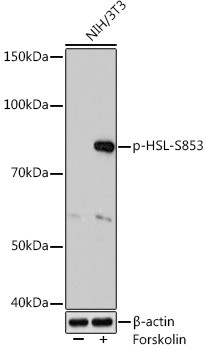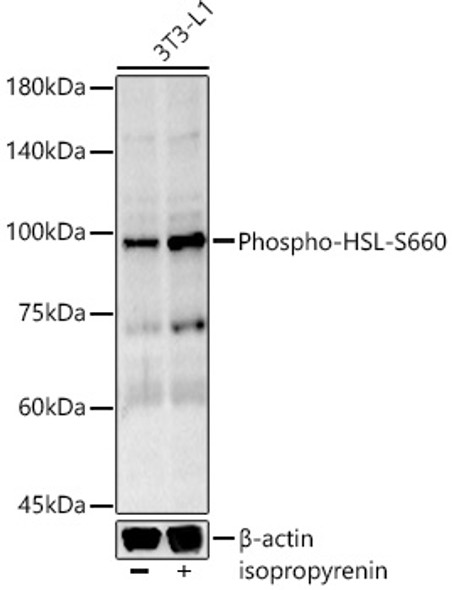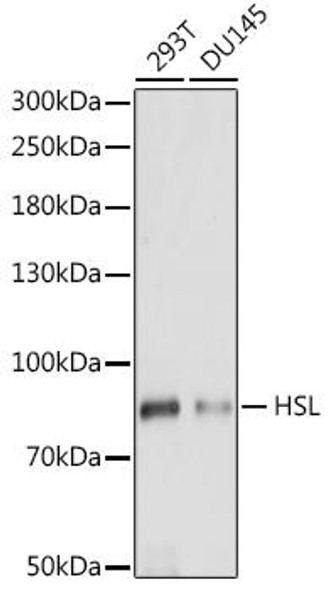Metabolism Antibodies 3
Anti-Phospho-HSL-S853 Antibody (CABP1151)
- SKU:
- CABP1151
- Product Type:
- Antibody
- Reactivity:
- Mouse
- Host Species:
- Rabbit
- Isotype:
- IgG
- Antibody Type:
- Monoclonal Antibody
- Research Area:
- Metabolism
Description
| Antibody Name: | Anti-Phospho-HSL-S853 Antibody |
| Antibody SKU: | CABP1151 |
| Antibody Size: | 20uL, 50uL, 100uL |
| Application: | WB |
| Reactivity: | Mouse |
| Host Species: | Rabbit |
| Immunogen: | A phospho specific peptide corresponding to residues surrounding S853 of human HSL (NP_005348.2 , equivalent to S563 of rat HSL) |
| Application: | WB |
| Recommended Dilution: | WB 1:500 - 1:2000 |
| Reactivity: | Mouse |
| Positive Samples: | NIH/3T3 |
| Immunogen: | A phospho specific peptide corresponding to residues surrounding S853 of human HSL (NP_005348.2 , equivalent to S563 of rat HSL) |
| Purification Method: | Affinity purification |
| Storage Buffer: | Store at -20°C. Avoid freeze / thaw cycles. Buffer: PBS with 0.02% sodium azide, 0.05% BSA, 50% glycerol, pH7.3. |
| Isotype: | IgG |
| Sequence: | Email for sequence |
| Gene ID: | 3991 |
| Uniprot: | Q05469 |
| Cellular Location: | Cell membrane, Cytoplasm, Membrane, caveola, cytosol |
| Calculated MW: | 83kDa |
| Observed MW: | 83KDa |
| Synonyms: | AOMS4, FPLD6, HSL, LHS |
| Background: | The protein encoded by this gene has a long and a short form, generated by use of alternative translational start codons. The long form is expressed in steroidogenic tissues such as testis, where it converts cholesteryl esters to free cholesterol for steroid hormone production. The short form is expressed in adipose tissue, among others, where it hydrolyzes stored triglycerides to free fatty acids. [provided by RefSeq, Jul 2008] |
| UniProt Protein Function: | HSL: hormone sensitive lipase is a lipolytic enzyme of the 'GDXG' family. Plays a rate limiting step in triglyceride lipolysis. In adipose tissue and heart, it primarily hydrolyzes stored triglycerides to free fatty acids, while in steroidogenic tissues, it principally converts cholesteryl esters to free cholesterol for steroid hormone production. Rapidly activated by cAMP-dependent phosphorylation under the influence of catecholamines. Dephosphorylation and inactivation are controlled by insulin. |
| UniProt Protein Details: | Protein type:EC 3.1.1.79; Lipase Chromosomal Location of Human Ortholog: 19q13.2 Cellular Component: lipid particle Molecular Function:protein binding Biological Process: lipid catabolic process; protein amino acid phosphorylation Disease: Abdominal Obesity-metabolic Syndrome 4 |
| NCBI Summary: | The protein encoded by this gene has a long and a short form, generated by use of alternative translational start codons. The long form is expressed in steroidogenic tissues such as testis, where it converts cholesteryl esters to free cholesterol for steroid hormone production. The short form is expressed in adipose tissue, among others, where it hydrolyzes stored triglycerides to free fatty acids. [provided by RefSeq, Jul 2008] |
| UniProt Code: | Q05469 |
| NCBI GenInfo Identifier: | 145559491 |
| NCBI Gene ID: | 3991 |
| NCBI Accession: | Q05469.4 |
| UniProt Secondary Accession: | Q05469,Q3LRT2, Q6NSL7, |
| UniProt Related Accession: | Q05469 |
| Molecular Weight: | 84,128 Da |
| NCBI Full Name: | Hormone-sensitive lipase |
| NCBI Synonym Full Names: | lipase E, hormone sensitive type |
| NCBI Official Symbol: | LIPE |
| NCBI Official Synonym Symbols: | HSL; LHS; AOMS4; FPLD6 |
| NCBI Protein Information: | hormone-sensitive lipase |
| UniProt Protein Name: | Hormone-sensitive lipase |
| Protein Family: | Hormone-sensitive lipase |
| UniProt Gene Name: | LIPE |
| UniProt Entry Name: | LIPS_HUMAN |







